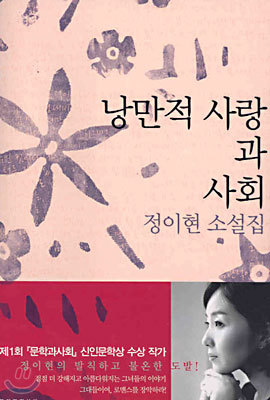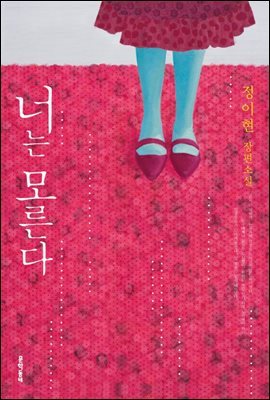Jeong Yi Hyun (born 1972) is a South Korean novelist.
Life
Jeong Yi Hyun was born in Seoul in 1972. She studied political science and gender studies at Sungshin Women's University and creative writing at Seoul Institute of the Arts.
Jeong began her literary career in 2002, winning the New Writer's Award from Literature and Society for her short story "Nangmanjeong saranggwa sahoe" (낭만적 사랑과 사회 Romantic Love and Society). She has since authored four novels, four short story collections, and three essay collections.
Jeong's first novel, Dalkomhan nauidosi (달콤한 나의도시 Sweet City of Mine) is considered to be the beginning of her fame. Regarded as igniting the chick lit boom in South Korea, it was adapted into the TV series My Sweet Seoul. Her novel Sarangui gicho: yeonindeul (사랑의 기초-연인들 Foundation of Love: A Couple’s Story) was part of a two-volume series exploring issues of love, marriage, and family, with Alain de Botton writing the second part.
Jeong is the recipient of the the Lee Hyoseok Literary Award for her short story "Tainui godok" (타인의 고독 The Loneliness of Others) and the Hyundae Munhak Literary Award for "Sampungbaekwajeom" (삼풍백화점 Sampoong Department Store).
Writing
In contrast to the Korean literary tradition of focusing on the marginalized and dispossessed, Jeong Yi Hyun's work depicts the dating, marriage, career lives, desires and conflicts of urban women. Her works are frequently set in the wealthy Seoul neighborhood of Gangnam, with snappy, upbeat descriptions. Jeong chooses to handle this reality through “politics of masquerade” in the Baudrillardian sense. Jeong’s characters happen to be young women with office jobs who are blatantly well-adjusted to the system. They are vicious and not ashamed of their desires to climb the socioeconomic ladder.
"Nangmanjeong saranggwa sahoe," the author's debut work, borrows its title from Jacqueline Sarsby's Romantic Love and Society. Jeong recounts about writing the story: "In grad school I did some research on the sexual experiences of unmarried women in their 20s. At the time a lot of research on women’s sexuality and the body was being published. My story was a kind of experiment combining social science case studies with literature. Even though it was published [20] years ago, I still meet women in their 20s who express their shock at reading it. I am intrigued that there are still people who find it radical. Since it means that the reality faced by 20-something women has hardly changed, I hope that ceases to be the case."[1]
Regarding her most well-known work, Dalkomhan nauidosi, whose television adaptation My Sweet Seoul is credited with the chick lit boom in South Korea, Jeong says: "I’m not sure about that, as chick lit has a set pattern. Chick lit always ends with the triumph of a female character; she undergoes a great deal of trouble but in the end she achieves success in both love and career. In that sense, My Sweet Seoul might be anti-chick lit. The story I wanted to tell did not lie within or outside established institutions. Rather, it was about the character—a kind of coming-of-age story that begins with the character at the starting line and ends with her still there." [1]
References
[1] Korea Literature Now. Vol.16, Summer 2012. https://www.kln.or.kr/frames/interviewsView.do?bbsIdx=517
En opposition àvec la littérature moderne de Corée qui se concentre sur les groupes marginalisés et les personnes démunies, Jung décrit les rencontres, les mariages, les carrières, les désirs et les conflits des femmes de la bourgeoisie. Ses œuvres sont souvent définies dans le cadre du quartier riche de Gangnam à Séoul. Elle est connue pour décrire la vie des femmes d'une manière forte et joyeuse. Ma ville sucrée (Na-ui dalkomhan doshi) est considéré comme le roman lui ayant apporté une grande popularité en Corée du Sud2 . Considéré comme une description authentique et réalistes des femmes coréennes ayant la trentaine, ce roman a été adapté en drama à la télévision et a suscité la sympathie de femmes coréennes de cette tranche d'âge. L'Institut coréen de traduction littéraire (LTI of Korea) présente son travail de cette manière : Jeong choisit de présenter cette réalité aux lecteurs à travers une « politique de la mascarade » au sens voulu par Baudrillard. Ses personnages sont des jeunes femmes occupant des emplois de bureau qui sont en apparence bien adaptées au système ; elles sont opportunistes et n'ont pas honte de leurs désirs pour grimper dans l'échelle socio-économique. Dans Amour romantique et société (Nangmanjeok saranggwa sahoe), le mariage est un moyen d'accéder à une classe sociale supérieure. Dans Le coffre (Teureongkeu), la mode et les voitures sont les symboles de cette évolution dans les classes sociales. Les femmes sont si complices et sournoises qu'elles sont souvent tournées au ridicule à la fin des récits. En décrivant les individus comme des prototypes parfaits du capitalisme et de la société de consommation, elle révèle la fausseté de ces personnages et des situations qui les entourent. Elle donne ainsi à la littérature les moyens de rester politique à une époque où cette dernière est dévalorisée aux yeux de la jeunesse
1972年、ソウル特別市に生まれる。2002年、短編『낭만적 사랑과 사회(ロマン的愛と社会)』で第1回文学と社会新人文学賞を受賞して文壇デビューした。2004年には短編『타인의 고독(他人の孤独)』で第5回李孝石文学賞を受賞、2006年には短編『삼풍백화점(三豊百貨店)』で第51回現代文学賞を受賞し、韓国文学界で最も注目を浴びる女性作家の一人となった。 鄭の小説に登場する人物と事件を現実的だと感じる20、30代の女性たちは、鄭の小説に熱狂的な支持を送っている。デビュー作である『낭만적 사랑과 사회(ロマン的愛と社会)』の主人公は、ソウルの富裕層が暮らす地域で生活してきたが、自分が富裕ではなかったので結婚を通じて身分の上昇を夢見たが挫折する話である。世俗的欲望を追求する人物の声を通して駆使される逆説的で反語的なユーモアは鄭の小説の特徴である。 鄭の小説はほとんどが、大都市に住んでいる中流以上の女性主人公の軽快で明るい姿を描いているということで、最近世界的に人気のあるCHICKLIT小説に分類されたりもする。しかし、経済的な豊かさと安定的な職業が果たして個人の幸せを保障できるかという問いに対する真摯な省察についても描いている。ドラマ化され人気を得た『달콤한 나의 도시(マイスウィートソウル)』は、世俗的な愛と欲望、結婚制度について事実的に表現しながらもその虚偽性を鋭く非難する作品である。
Geboren 1972 in Seoul. 2002 gewann ihre Erzählung “Romantische Liebe und die Gesellschaft” den ersten vergebenen Preis für neue Schriftsteller der Zeitschrift “Literatur und Gesellschaft”. 2004 erhielt Jeong Yi-Hyun für ihre Erzählung „Die Einsamkeit der Anderen“ den Yi Hyo-sok Literaturpreis und zwei Jahre darauf wurde ihr für die Kurznovelle „Sampung Shopping Mall“ der Preis für Moderne Literatur verliehen. Neben „Das verstehst du nicht“ sind von ihr die zwei Erzählbände „Romantische Liebe und die Gesellschaft“ (2003) und „Die Lüge von Heute“ (2007) erschienen sowie mit „Meine süße Stadt“ (2006) ein weiterer Roman.
Чон Ихён родилась в 1972 году в Сеуле. Ее литературная деятельность началась с написания повести "Романтическая любовь и общество", которая в 2002 году была удостоена премии "Литература и общество" за лучший писательский дебют. В 2004 году рассказ "Чужое одиночество" получил литературную премию им. Ли Хё Сока, а в 2006 году рассказ "Универмаг Сампхун" получил премию "Современная литература". Автор сборников рассказов "Романтическая любовь и общество" (2003 г.) и "Сегодняшняя ложь" (2007 г.), а также романа "Мой сладкий город" (2006 г.).
정이현(1972~)은 대한민국의 소설가다.
생애
정이현은 1972년 서울에서 태어났다. 성신여자대학교 정치외교학과를 졸업했고, 동 대학원 여성학과를 수료했다. 서울예술대학 문예창작과에서 공부했다.
작가는 단편 〈낭만적 사랑과 사회〉로 2002년에 제1회 '문학과 사회' 신인 문학상을 수상하며 작품 활동을 시작했다. 2003년 소설집 《낭만적 사랑과 사회》를 출간했다. 문학적 엄숙주의를 벗어나 경계 없는 상상력과 독특한 언어 구성력, 신세대 로맨스의 정치, 사회적 역학에 대한 통찰력으로 문단과 대중의 주목을 받았다. 2009년에 출간한 장편 《너는 모른다》는 솔직담백하게 표출된 21세기 도시 남녀의 삶에 대한 다양한 가치관, 빠른 이야기 전개, 젊은 도시인들의 생활코드와 감성을 적재적소에 포진시키는 탁월한 능력으로 주목받았다. 작가의 대표작인 장편소설 《달콤한 나의 도시》는 2008년에 TV 드라마 <달콤한 나의 도시>로 만들어졌다.
작품 세계
정이현은 남성중심적 가치관이 지배하는 부조리한 사회를 뒤틀고 비판하는 작품을 주로 발표해왔다. 특히 젊은 남녀들이 지닌 삶에 대한 다양한 가치관, 속도감 있는 전개 그리고 도시인들의 생활코드와 감성을 적재적소에 포진시키는 구성을 통해 일상을 풍속화하고 있다.
소설집 《오늘의 거짓말》(2007)에서 작가는 제도와 상식의 틀을 벗어나지 않는 평범한 인물들이 지닌 저마다의 상처를 세밀한 시선으로 담아내었다.
장편 《안녕 내 모든 것》(2013)은 1990년대를 지나온 한 세대의 고백이자, 우리 모두의 과거와 현재를 되묻는 작품이다. 작가는 김일성이 죽고 삼풍백화점이 무너지던 1990년대 중반을 함께 보낸 세 인물들의 이야기를 통해 그들이 공유한 한 시절의 우정과 사랑 그리고 성장의 과정을 보여준다.
소설집 《상냥한 폭력의 시대》(2016)는 사랑에 냉소적인 여성들의 이야기들이 수록된 작품집이다. 작가는 거대한 역사에 가려진 개인의 고통과 상실을 소설집의 공통된 주제로 삼았다.
장편소설 《알지 못하는 모든 신들에게》(2018)는 도시라는 도식적이고 메마른 공간 속에서 타인에 대한 무관심과 이기적인 태도로 삶을 살아가는 사람들의 이야기다. 작가는 작중 인물들이 타인이 아닌 자신을 외면하고, 각자의 내면에 존재하는 진정한 자아와 만나지 못하는 불안의 문제를 작품의 전면에 내세워 질문을 던지고 있다.
주요 작품
1) 소설집
《낭만적 사랑과 사회》, 문학과지성사, 2003.
《오늘의 거짓말》, 문학과지성사, 2007.
《상냥한 폭력의 시대》, 문학과지성사, 2016.
《하트의 탄생》, 창비, 2022.
2) 장편소설
《달콤한 나의 도시》, 문학과지성사, 2006.
《너는 모른다》, 문학동네, 2009.
《안녕 내 모든 것》, 창비, 2013.
《알지 못하는 모든 신들에게》, 현대문학, 2018.
3) 산문집
《작별》, 마음산책, 2007.
《풍선》, 마음산책, 2007.
수상 내역
2004년 제5회 이효석문학상
2006년 제51회 현대문학상





